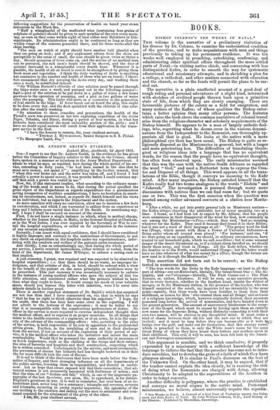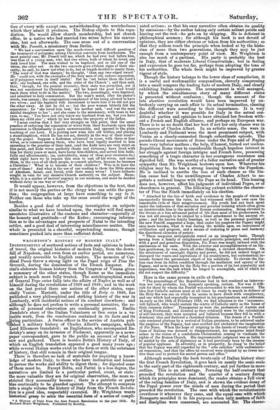BOOKS.
BISHOP COLENSO'S TEN WEEKS IN NATAL!
THIS volume is the narrative of a preliminary visitation of his diocese by Dr. Colenso, to examine the ecclesiastical condition of the province, and to make acquaintance with men and things previously to taking up his permanent residence. It was ten weeks well employed in preaching, catechising, confirming, and administering other spiritual offices throughout the more settled parts of Natal—in visiting native chiefs, and conversing with less distinguished Kafirs, in order to smooth the way for systematic educational and missionary attempts, and in sketching a plan for a college, a cathedral, and other matters connected with education and the church, so far as the funds will permit the plans to be car- ried out.
The narrative is a plain unaffected account of a good deal of rough riding and personal adventures of a slight kind, intermixed with sketches of civilized people thrown back upon a primitive state of life, from which they are slowly emerging. There are favourable pictures of the colony as a field for emigration, and many notices of the Kafirs; of whose qualities the Bishop enter- tains a better opinion than many other persons. The features which raise the book above the common narratives of colonial travel arise from the religious character and scholarly acquirements of the Bishop himself. He appears to be a man of largely catholic feel- ings, who, regretting what he deems error in the various denomi- nations from the Independent to the Romanist, can thoroughly ap- preciate all that is good. He looks at the native with a more philosophical eye than has been usual. The Bishop is quite as re- ligiously disposed as the Missionaries in general, but with a larger and more penetrating ken. The difficulties of translating theolo- gical or religious ideas into a language that has no equivalent words, for the reason that the people have no equivalent thoughts, has often been observed upon. The early missionaries assumed that this was the case with the native South Africans as regarded the word " God," and used a Hottentot term to express the Crea- tor and Disposer of all things. This word appears in all the trans- lations of the Bible, though it conveys no meaning to the Kafir mind. After many inquiries, the Bishop satisfied himself that the Kafirs really had two terms analogous to the words "Elohim" and "Jehovah." The investigation is pursued through many more discussions with natives than we can find room for ; but we quote one or two. This was the first occasion when the question was mooted among rather advanced converts at a station near Maritz- burg.
"After a while, we got into pretty general talk on Missionary matters— the Kafirs always observing the admirable law of never speaking two at a time. I found, as I had been led to expect by Mr. Allison, that his people were unanimous in their disapproval of the• word for God, now commonly in use among the Missionaries—unm,—which, they said, had no meaning whatever for the Kafirs. They used it because they found it in their,es • but it was not a word of their language at all.' The proper word for God was iTongo, which meant with them a Power of Universal Influence—a Being under whom all around were placed." For instance,' said one, ' if we were going on an expedition, we should, in ordinary circumstances, have trusted to our household gods, which we call ainaHlose ; but if some unusual danger of the desert threatened us, or if a violent storm terrified us, we should
i throw these away, and trust in iTongo. All the Kafir tribes, whether on the frontier or to the North, would understand iTongo ; but the latter would have no idea whatever of what was meant by a uTixo, though the former are now used to it through the Missionaries.' "
This assertion did not turn out to be correct ; as the Bishop tested in numerous instances.
" The true words for the Deity in the Kafir language—at least in all this part of Africa—are undfulunkulu, literally, The Great-Great One = The Al- mighty, and um Velinqange—literally, The First Comer-out = The First Essence, or, rather, Existence. It will be seen, as my narrative proceeds, that in every instance, whether in the heathen kraal, amidst the wildest of
'
savages or in the Missionary station, in the. presence of the teacher, who was himself surprised at the result, my inquiries led me invariably to the same point—namely, that these words have been familiar to them from their childhood, as names for Him who created them and all things,' and as traces of a religious knowledge, which, however originally derived, their ancestors possessed long before the arrival of missionaries, and have handed down to the present generation. The amount of unnecessary hinderanee to the recep- tion of the Gospel which must be caused by forcing upon them an entirely new name for the Supreme Being, without distinctly connecting it with their own two names, will be obvious to any thoughtful mind. It must make a kind of chasm between their old life and the new one to which they are invited ; and it must be long before they can become able as it were WA bridge over the gulf, and make out for themselves, that this strange name, which is preached to them, is only the White man's name for the same Great Being of whom they have heard their fathers and mothers speak in their childhood. This evil, it will be seen, has been felt both by the Ameri- can and Norwegian missionaries."
This argument is sensible, and we think conclusive, if properly expounded by a missionary with a sufficient knowledge of the language to enforce the fact that the preacher has come not to intro- duce novelties, but to develop the germ of a faith of which they have glimpses already. It is similar to Paul's discourse on the text of the Unknown God. On the other hand, it may be argued, that if i
the teacher cannot explain the idea clearly, he is running the risk of doing what the Eomanista are charged with doing, allowing Christianity to be adapted to the superstitions of the heathen in order to tempt converts. Another difficulty is polygamy, where the practice is established and conveys no moral stigma to the native mind. Protestant missionaries, we believe, almost universally require the repudia-
• Ten Weeks in Natal. A Journal of a first Tour of Visitation among the Colo+ nista and Zulu Kars of Natal. By John William Colenso, D.D., Lord Bishop of the Diocese. Published by Macmillan, Cambridge.
tion of every wife except one, notwithstanding the wretchedness whioh they admit it produces. The Bishop objects to this repu- diation. He would allow church membership, but not church office, tb a, native who had married two wives before his conver- sion, but not afterwards. The case arose out of a conversation- with Mr. Posselt, a missionary from Berlin. " We had a conversation upon the- much-vexed and difficult question of the treatment of polygamy among Christian converts from heathenism. The most painful case, Mr. remelt told me, which he had ever had before him, was-that of a young man, who bad two wives, both of whom he loved, and bbth loved him. The man wished to be baptized, and so did one of the wives, the other not. As the two converts gave evident signs of their sin- cerity, he mid, he knew not what to do, but at length decided to marry them. The word of God was sharper,' he thought, than any two-edged sword.' Ee ' could not, with the examples of the holy men of old enforce separation, as if polygamy were in itself sinful.' But he 'set before them the Lord's will; one husband, one wife, and the order of the Church' ; and then said, that, ' though, for the present necessity, their state was permitted, yet it was not sanctioned' by Christianity ; and he hoped the good Lord would teach them what to do in the matter.' The two, accordingly, were baptized, and admitted to holy communion. But the man's mind, after his pastor's words, was uneasy; the congregation complained of his being allowed to have two wives ; and the baptized wife threatened to leave him if he did not put the other away. At last he did so : but the poor woman bitterly felt the separation;; for 'she loved him best,' his mother said, and was the most dutiful daughter to her' ; and she came to the missionary, with tears in her eyes, to say, ' You have not only taken my husband from me, but you have taken my child also' ; which by law became the property. of the father.
" I must confess that I feel very strongly on this point, that the usual practice of enforcing the separation of wives from their husbands upon their i
conversion to Christianity is quite unwarrantable, and opposed to the plain teaching-of our Lord. It is putting new wine into old bottles, and placing a stumblingblock, which He has not set, directly in the way of their receiv- ing the gospel. Suppose a Kafirman advanced in years, with three or four wives, as is common among them, who have been legally married to him abooreiag to the practice of their-land, (and the Kafir laws are very strict on this point, and Kafir wives perfectly chaste and virtuous,) have lived with him for thirty years or more, have borne him children, and served him faith- fully and affectionately, (as, undoubtedly, many of these poor creatures do,) What right have we to require this man to cast off his wives, and cause them, in the eyes of all their people, to commit adultery, because he becomes a Christian ? What is- to become of their children ? Who is to have the care of them? And what is the use of our reading to them the Bible stories of Abraham, Israel, and David, with their many wives ? I have hitherto sought in vain for any decisive Church authority on the subject. Mean- while, it is a matter of mutant urgency in our missions, and must-be decided without delay in one way or other."
It would appear, however, from the objections in the text, that it is not merely the parties or the clergy who can settle the ques- tion; the congregation at large have something to say to it. Neither can those who take up the cross avoid the weight of the burden.
Besides a good deal of interesting investigation on subjects similar to what we have touched upon, the reader will find many anecdotes illustrative of the customs and character--especially of the honesty and gratitude—of the Kafirs ; encouraging informa- tion as to the advantages and prospects of: Natal to the intending settler, and a good deal of interesting miscellaneous matter. The whole is presented' in a cheerful, unpretending manner, though ;sometimes pushed into more than sufficient detail.



























 Previous page
Previous page